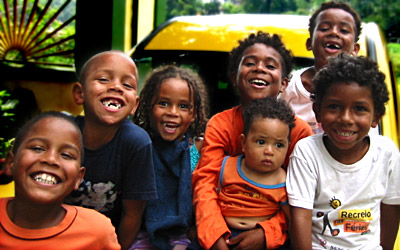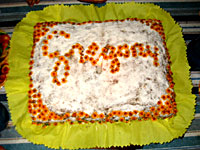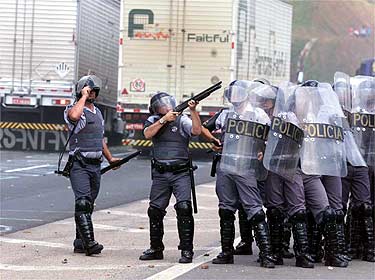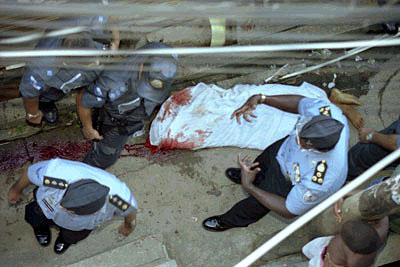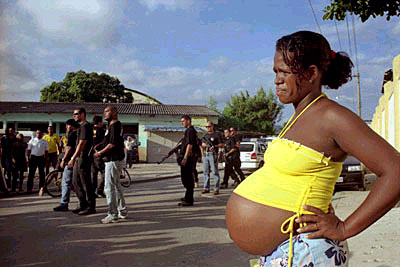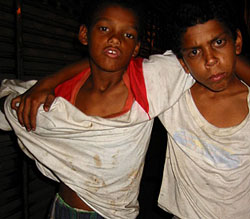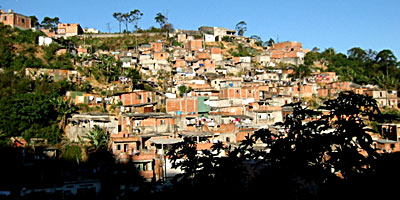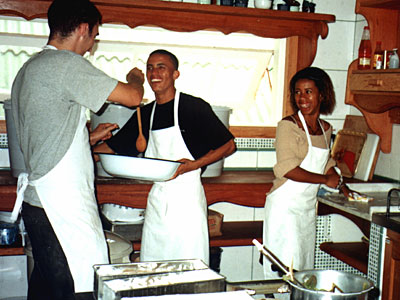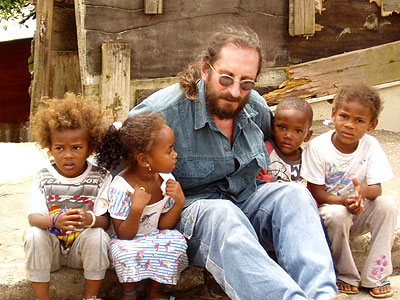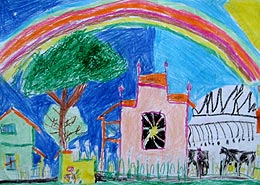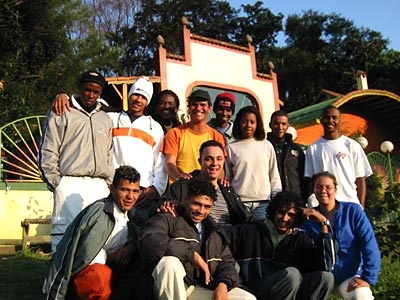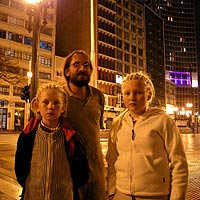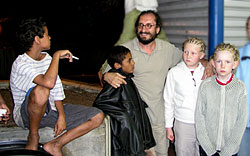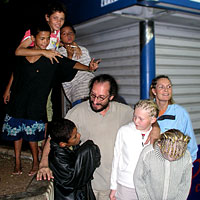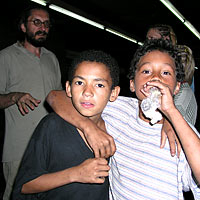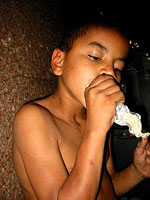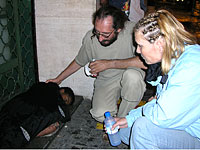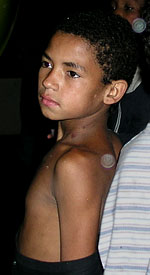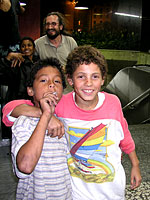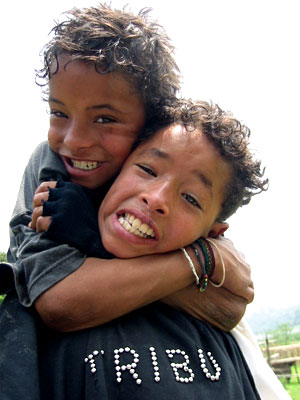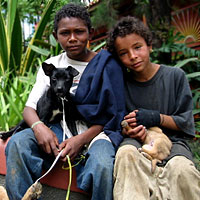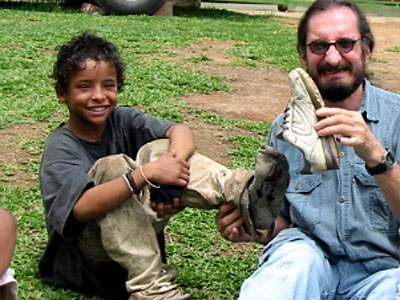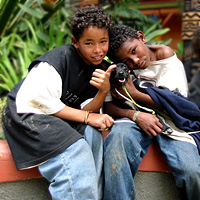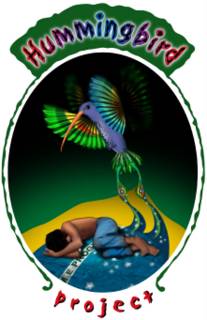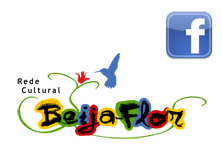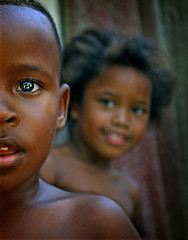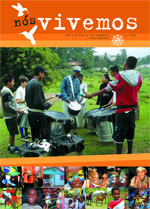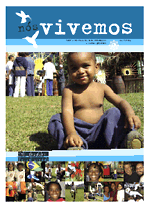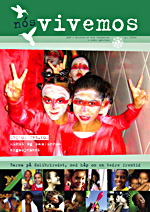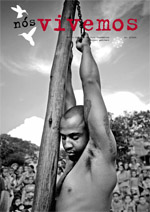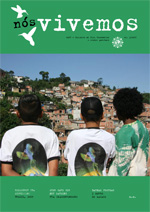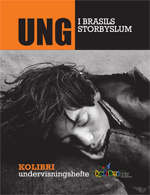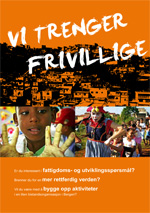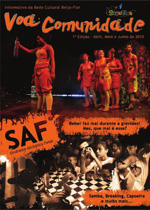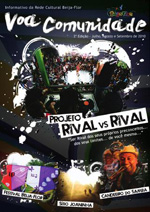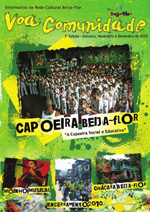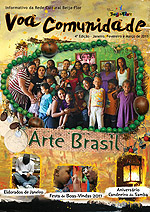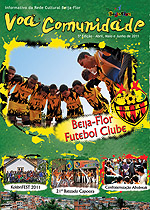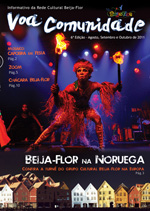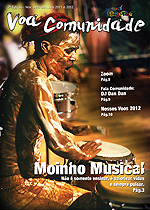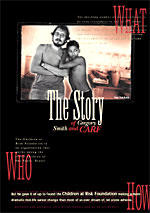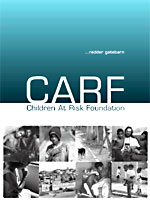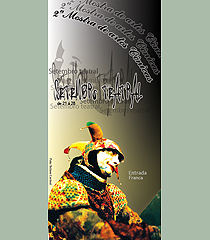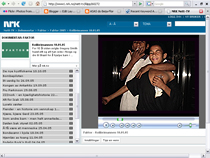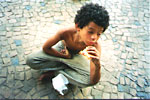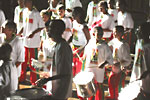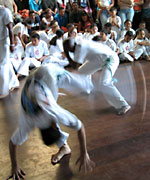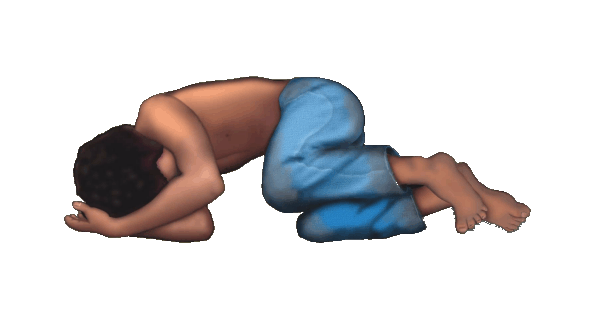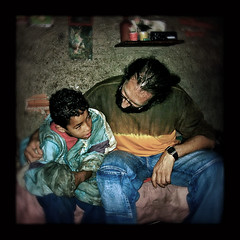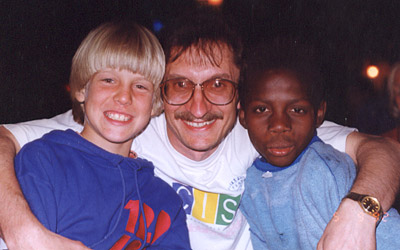 Interaction between street children and CISV youth in Lisbon 1992. - Who’s better qualified to lead the way?
Interaction between street children and CISV youth in Lisbon 1992. - Who’s better qualified to lead the way?Sustainable development for future generations begins with our children.
Following-up on one of my earlier postings,
"Journey to an Unknown World", I would like to share with you a little more of our recent experience of Cross-cultural Global Interaction between children from the developed world (Norway) and children of Hummingbird’s Street Migration Prevention Programme in Brazil. Without doubt, this interaction coincides with the vision of our organization, calling for further actions and stronger support so that even more children can gain access. In doing so, facilitating the creation and development of their own ideas for social change on a global level.
The benefits gained from interaction between children from the developed world and those who temporarily depend on our actions, makes global thinking not just a means but also a real necessity.
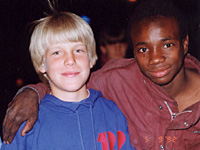 Street children and CISV youth in Lisbon 1992. - Sowing the seeds of peace through Cross-cultural Global Interaction
Street children and CISV youth in Lisbon 1992. - Sowing the seeds of peace through Cross-cultural Global Interaction
Back in 1992, during my commitment as a parent and leader with the international CISV (Children’s International Summer Villages) in Norway, I was questioning the why’s and how’s to develop an exchange programme, where impoverished children from developing countries could have access, participating and contributing with their own life values. Why should the promotion of peace only be reserved for the wealthy? Is it to be that only the views of the privileged classes shall dominate and be decisive for world peace? If so, then we are doing a rather inadequate job of things, and certainly not one in accordance with the desires of most young people.
During a short stay in Lisbon, prior to my coming to Brazil, I organized an experimental interaction between street children there and youth members of the Lisbon group of CISV. There was certainly a need to shorten the gap between the privileged and the impoverished, which even in one of Europe’s less wealthy countries was clearly visible.
 Street children and CISV youth in Lisbon 1992. - Closing the gap between the privileged and the impoverished.
Street children and CISV youth in Lisbon 1992. - Closing the gap between the privileged and the impoverished.
Global instability, conflict and war have their main roots in poverty and the extreme socio-economic and socio-cultural differences profound in many developing countries today. The distance between rich and poor is steadily increasing and, as a parallel to all this, the negative consequences are seriously affecting our societies. Violence, corruption and the progressive egoism on both sides make this survival game nothing less than a perverse show of political and public incompetence.
In the meantime our children will keep on suffering; impoverished children, having to withstand a total lack of basic needs along with the fact that their international rights are constantly infringed. The more privileged children, who although have an abundance of what the other half don't have, still suffer from other deficiencies and frustrations common in their society.
So who’s better qualified to lead the way?
 Former street children from The Hummingbird Project in Brazil lead the way teaching young people the art of Capoeira in the town square of Bergen in Norway.
Former street children from The Hummingbird Project in Brazil lead the way teaching young people the art of Capoeira in the town square of Bergen in Norway.
In Norway we have had an incredibly positive experience with our Capoeira Exchange Programme, which is now running into its fifth year. Our
Hummingbird Capoeira Centre has been training children and young people for more than ten years. Capoeira is our principal programme for the recuperation of street children. Some of the first children to leave the streets in 1993 are now young adult instructors at the centre, which today attends approx. 250 children in its activities. Through self-development and the experience gained from their own activities at Hummingbird, former street children have inspired the creation of a Norwegian based Capoeira Academy called
Capoeira na Chuva together with young people in Norway.
 Former street kid Fabio (lying on the floor at centre) was one of our youth trainers leading the first Capoeira Workshop for Norwegian youth in Bergen in 2000.
Former street kid Fabio (lying on the floor at centre) was one of our youth trainers leading the first Capoeira Workshop for Norwegian youth in Bergen in 2000.
Today
Capoeira na Chuva (Capoeira in the Rain) has approx. seventy regular members and facilitates regular visits for youth trainers from the Hummingbird Capoeira Centre in cooperation with CARF Norway. Each summer our youth trainers lead a Capoeira Workshop in Bergen for the group’s members and also to attract new-beginners to this remarkable sport. This year members of the group came for a ten-day visit to Hummingbird. Hopefully this interaction between youngsters involved in Capoeira, on both sides of the globe, will produce fertile grounds for a clearer understanding of each other’s reality.
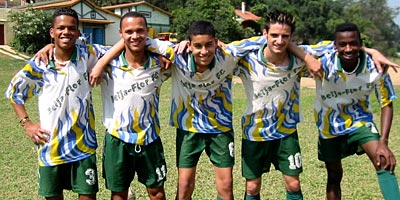 Young talented players from Hummingbird’s Football Club have embraced the opportunity to participate with Norwegian youth at a football training school in Spain.
Young talented players from Hummingbird’s Football Club have embraced the opportunity to participate with Norwegian youth at a football training school in Spain.
We recently initiated a similar action with youngsters from Hummingbird’s Football Club, which has resulted in six of our players travelling to Norway and Spain for three months, interacting with Norwegian youth at a football training school in Mallorca. The school,
Team Football Talent, are themselves sponsoring the boys for their entire stay and it is independent initiatives for global interaction like this one that we value highly. Hopefully the experience will not only be of great personal benefit to our participants, but will also have an impact on all those involved in this admirable cross-cultural initiative.
Opportunities for our young people, to become part of something in totally contrasting environments, such as those offered in Norway and Spain, have already made an impact on their lives and helped them realize that their contribution is also highly valued by those who grow up under much more privileged living conditions than they themselves are doing.
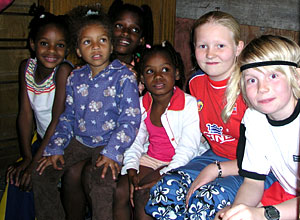 Håkon and Sunniva from Norway spent a busy week getting to know the realities of life for many of the impoverished children connected to CARF’s Street Migration Prevention Programme.
Håkon and Sunniva from Norway spent a busy week getting to know the realities of life for many of the impoverished children connected to CARF’s Street Migration Prevention Programme.
Taking this a step further, the recent visit of two teachers and two 11-year old pupils from
Aurdalslia School, one of our Hummingbird supporting schools in Norway, has ploughed new grounds for a better understanding between two entirely different worlds. Taking part in activities at The Hummingbird Activity Centre and seeing and feeling the reality of life in shantytowns and the streets where many of our children come from, has created an entirely different impression in their minds than the more superficial ones commonly served to them through the mass media.
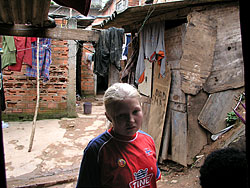 That the happy children she got to know at Hummingbird lived under such impoverished conditions made quite an impression on Sunniva. A new experience that may challenge her own values.
That the happy children she got to know at Hummingbird lived under such impoverished conditions made quite an impression on Sunniva. A new experience that may challenge her own values.
As they leave permanent impressions, real-life experiences are of course much more valid than what the mass media can serve us. The obligations born from these memorable personal experiences are also much more difficult to ignore. Our sub-conscience creates a certain compromise with the experience and leads us to take action, one way or the other. On their return home, 11-year old Håkon and Sunniva were met with a storm of questions from their school colleagues after their one-week experience at Hummingbird.
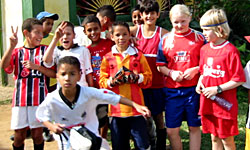 Håkon and Sunniva took part in most of the activities at The Hummingbird Activity Centre, the base for CARF’s Street Migration Prevention Programme.
Håkon and Sunniva took part in most of the activities at The Hummingbird Activity Centre, the base for CARF’s Street Migration Prevention Programme.
Håkon tells us that his first week back at school went OK but that there were so many questions to be answered. He also mentioned that he had some difficulty getting to sleep because he, to be honest, missed everyone at Hummingbird. Sunniva explained that on her first week back at school, she and Håkon had held lectures and that the classrooms had been packed each time. I have told them that they are our most important Ambassadors, a bridge between our two worlds.
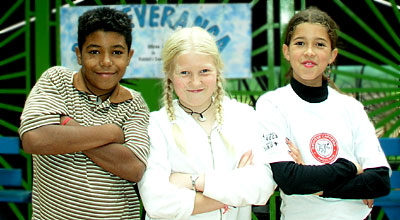 Marcos, Sunniva and Franciane, bridging the gap between our two worlds.
Marcos, Sunniva and Franciane, bridging the gap between our two worlds.
The impact of their latest experiences is reflected in their resulting actions and the enormous interest shown by schoolmates, teachers, family members and friends, making their annual Brazil Market a gigantic success, which again resulted in strengthening the financial support for and commitment to our programme. Their interaction with our children in Brazil was a most important move in nurturing their school, which has already been a steady supporting partner of CARF since 1993.
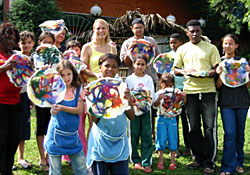 Their teacher Hilde, taught our children how to make handcrafts in soft Norwegian wool, to be sold at their annual Brazilian Market in Norway the following week. A new and exciting way of painting pictures with wool, explained some of the children, who already sell many of their own colourful paintings at the market.
Their teacher Hilde, taught our children how to make handcrafts in soft Norwegian wool, to be sold at their annual Brazilian Market in Norway the following week. A new and exciting way of painting pictures with wool, explained some of the children, who already sell many of their own colourful paintings at the market.
This expansive activity and resulting beneficial actions by our supporting schools in Norway are clear examples of the compromise created through global interaction between children linked to our programme. For several years now CARF has arranged visits to Norway for children from our programme in Brazil. The objective has always been to create moments of interaction between the two groups, the privileged children of our supporting schools and the impoverished children attended at Hummingbird. These interactions have taken place in the form of Capoeira and folkloric presentations, kite making workshops and open discussion groups, where children from both worlds have contributed.
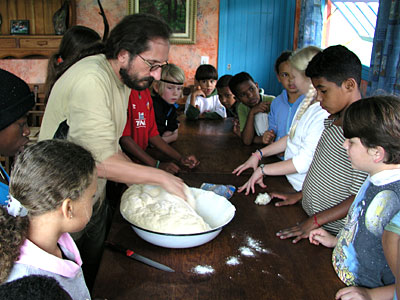 Baking one’s daily bread was common in Norway before wealth changed all of that. Now we have taken over this humble tradition, here baking our own healthy bread with Håkon and Sunniva at Hummingbird.
Baking one’s daily bread was common in Norway before wealth changed all of that. Now we have taken over this humble tradition, here baking our own healthy bread with Håkon and Sunniva at Hummingbird.
I look forward to an expansion of our global interactions in the near future by arranging possibilities for children to exchange living experiences in each other’s home and school environments, helping them to evaluate and reflect over obvious differences in each other’s cultural reality. We need to discover ways of diminishing human egoism so that children from both worlds can grow up in safe and healthy environments without having to either struggle for survival or waste their material abundance more than is absolutely necessary.
 In 2002, thirteen Brazilian children from Hummingbird visited many of our supporting schools in Norway on an exciting three week tour with Afro-brazilian cultural presentations. Here they light their torches for peace in front of 30.000 people present at the traditional pre-Christmas event in Bergen.
In 2002, thirteen Brazilian children from Hummingbird visited many of our supporting schools in Norway on an exciting three week tour with Afro-brazilian cultural presentations. Here they light their torches for peace in front of 30.000 people present at the traditional pre-Christmas event in Bergen.
I sincerely believe that actions such as those described above will not only cultivate a more humane and peaceful global community but also reflect in our consumer mentality, ecological preservation of natural resources and the sustainable development of future generations.
Gregory J. Smith
Social Entrepreneur and Founder
The Children At Risk Foundation - CARF
If you are interested in sponsoring our global interactions you are most welcome to contact CARF Brasil
